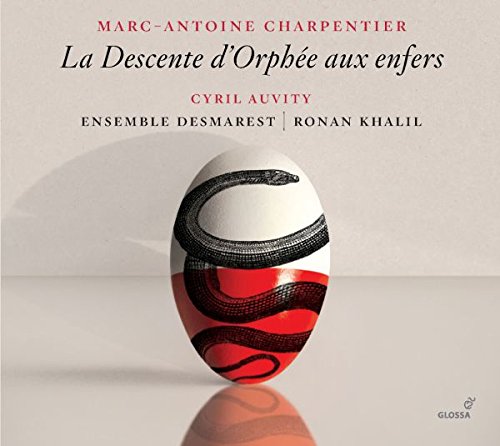CHARPENTIER La descente d’Orphée aux Enfers (Khalil)
View record and artist detailsRecord and Artist Details
Composer or Director: Marc-Antoine Charpentier
Genre:
Opera
Label: Glossa
Magazine Review Date: 08/2018
Media Format: CD or Download
Media Runtime: 61
Mastering:
DDD
Catalogue Number: GCD923602

Tracks:
| Composition | Artist Credit |
|---|---|
| (La) Descente d'Orphée aux enfers |
Marc-Antoine Charpentier, Composer
Céline Scheen, Eurydice, Soprano Cyril Auvity, Orphée, Tenor Dagmar Sasková, Aréthuze, Soprano David Witczak, Bass Ensemble Desmarest Etienne Bazola, Pluton, Baritone Floriane Hasler, Proserpine, Mezzo soprano François-Nicolas Geslot, Haute-Contre Guillaume Gutierrez, Tantale, Tenor Jeanne Crousaud, Oenone, Soprano Kevin Skelton, Ixion, Tenor Mailys de Villoutrey, Daphne, Soprano Marc-Antoine Charpentier, Composer Ronan Khalil, Conductor Virgile Ancely, Apollon; Titye, Bass-baritone |
Author: Lindsay Kemp
The tone of the performance is set as early as the Ouverture, whose light and airy texture suggests that it is to be characterised by intimacy and delicacy by comparison with the slightly firmer Les Arts Florissants under William Christie and the heavier Boston Early Music Festival players (who use oboes instead of flutes) under Paul O’Dette and Stephen Stubbs. There is perhaps also a greater sense of ensemble involvement and enjoyment in the earlier scenes, symbolised by the sweetly tinkling harpsichords and enthusiastic strumming and drumming of the dances and interludes.
But this piece must surely live or die by its Underworld scene, powerfully realised by Charpentier in a sequence of deepeningly ardent monologues for Orpheus in which the beauty of his singing is enriched by the irresistible seductive force of three bass viols. Khalil’s handling is passionate and convincing; but while Cyril Auvity’s clear high tenor certainly delivers the urgency of Orpheus’s complaints, the hard shallowing-out of his voice in his loudest outbursts can make them feel a little petulant. While more vivid than Aaron Sheehan’s Boston Orpheus, he cannot match Paul Agnew’s for Les Arts Florissants, which achieves a truly Orphic synthesis of persuasive insistence and vocal control that is hard to imagine surpassed. Christie’s overall handling of the drama, indeed, has a level of assurance few others can achieve, but there is life and commitment enough in Khalil’s to make it a version well worth hearing.
Discover the world's largest classical music catalogue with Presto Music.

Gramophone Digital Club
- Digital Edition
- Digital Archive
- Reviews Database
- Full website access
From £8.75 / month
Subscribe
Gramophone Full Club
- Print Edition
- Digital Edition
- Digital Archive
- Reviews Database
- Full website access
From £11.00 / month
Subscribe
If you are a library, university or other organisation that would be interested in an institutional subscription to Gramophone please click here for further information.




